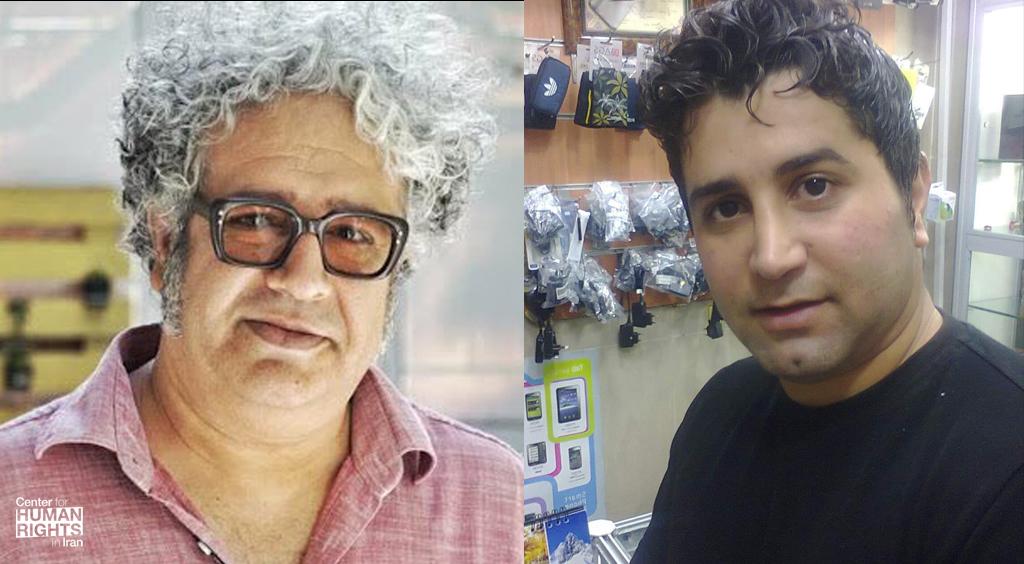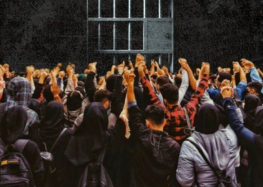Writer in Coma, Another Political Prisoner Dead after Unjust Imprisonment in Iran

Baktash Abtin (left) and Adel Kianpour (right).
Concerns Mount for Prisoners Under Judiciary Chief Gholam-Hossein Mohseni-Eje’i
COVID-19 in Crowded Jails and Routine Denial of Medical Treatment Put All at Risk
Jan 3, 2022 – News of an imprisoned political prisoner dying after going on hunger strike in Iran, and a writer struggling to survive in a Tehran hospital after contracting COVID-19 in jail highlights the dire situation of all prisoners in the country, the Center for Human Rights in Iran (CHRI) said in a statement today.
“Judiciary Chief Gholam-Hossein Mohseni-Eje’i is responsible for the safety of all prisoners yet his track record demonstrates criminal disregard for human life,” said CHRI Executive Director Hadi Ghaemi.
“We are extremely concerned for all prisoners in Iran and call on the U.N. and governments worldwide, especially those now in negotiations with Iran, to demand that political prisoners be freed and that all prisoners be allowed fair trials and access to proper medical treatment, food and safe shelter,” added Ghaemi.
Adel Kianpour (age unknown) died in Sheiban Prison in Ahvaz, southwest Iran, on January 1, 2022, after a weeklong hunger strike to protest being imprisoned without due process or a fair trial, reported the Ahvaz Human Rights Organization.
That same day, Baktash Abtin, 48, a board member of the persecuted Iranian Writers Association (IWA), was put into an induced coma in a Tehran hospital after being rushed there from Evin Prison on December 14 with severe symptoms of COVID-19.
Peacefully Expressing Dissent Lands One In Prison
Kianpour was denied access to a lawyer while being held for interrogations after being arrested in August 2020 upon return to Iran and went on hunger strike to demand a fair trial.
“You said that anyone with security issues who lives abroad should return to Iran and we will help him return to life,” said Kianpour addressing Mohseni-Eje’i in a leaked audio message from prison. “Did you mean life in prison?”
Few details are known about the events leading to Kianpour’s arrest other than he was serving a three-year sentence on “national security” charges that are used to jail peaceful activists: “spreading propaganda against the regime,” “propaganda in favor of opposition groups” and “disturbing public opinion with the intention of disrupting national security.”
Abtin is a prominent writer and freedom of speech advocate who has been imprisoned along with two fellow Iranian Writers Association board members, Reza Khandan Mahabadi and Keyvan Bajan, since September 2020.
“While protesting against the judiciary, the State Prisons Organization and all other responsible agencies, we the political prisoners of Ward 8 in Evin Prison hold them all responsible for the consequences of Baktash’s illness, not COVID-19,” said a statement by a group of prisoners in Evin Prison’s Ward 8 published by the Akhbar Rooz Persian-language website on January 3, 2022.
“His suffering during the past month has been the direct result of actions by the state and prison authorities,” tweeted the Iranian Writers Association on January 2.
Prisoners in Iran are highly exposed to COVID-19 due to prisons that are crowded, unclean, and lacking basic safety procedures for testing, separation and treatment of ill prisoners.
Abtin and his IWA colleagues were sentenced in May 2019 to six years prison each on charges of “propaganda against the state” (one year) and “assembly and collusion against national security” (five years) for peaceful actions including publishing documents about the IWA’s history and statements against censorship, and organizing memorial ceremonies for IWA members who had been killed by state agents in the 1990s.
In December 2019, Branch 36 of the Appeals Court upheld a five-year prison sentence against Abtin and Mahabadi for “assembly and collusion against national security” and reduced Bajan’s sentence to three years and six months.
At least 11 writers are known to be either currently imprisoned or living with an unserved prison sentence hanging over their heads as they await an appeal or to be summoned to jail, according to a list compiled by CHRI.
These writers were all unjustly targeted by intelligence agencies and the judiciary for practicing and advocating freedom of speech.
Judiciary and Country Both Headed by Gross Human Rights Violators
Mohseni-Eje’i was appointed to judiciary chief by Supreme Leader Ali Khamenei in July 2021 by President Ebrahim Raisi who came to power that year after an engineered election in which all viable opposition candidates were banned from running. Both men are known for gross human rights violations.
While the actual number is unknown, news reports indicate that at least three political prisoners—who were in jail in Iran for peaceful actions or their beliefs—died as a result of inadequate medical treatment or ill treatment in Iran in 2021 including Adel Kianpour, Sasan Niknafs, and Behman Mahjoubi.
Iranian authorities have failed to provide accountability for at least 72 deaths in custody since January 2010, despite credible reports that they resulted from torture or other ill-treatment or the lethal use of firearms and tear gas by officials, according to a report by Amnesty International.
Amnesty noted that the real number of deaths in custody is likely much higher given the lack of transparency in Iran’s justice system and the fact that many human rights violations go unreported due to widespread fear of reprisal and systematic repression of civil society.
Dozens of political prisoners are among those who have perished in Iranian prisons, according to the report.






